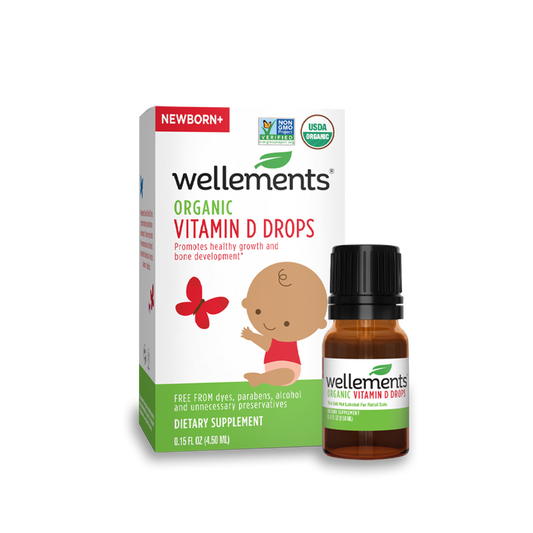How To Incorporate Multivitamins Into Your Baby's Routine
| updated:Share

It never fails. You think you're doing alright as a new parent, but then you walk into the local pharmacy or talk to your local moms' group. Every manufacturer seems to have a take on supplements your baby "needs," and every parent seems to know some critical information you are missing about nutrition.
As always, it is best to only listen to medical professionals on nutrition and health. Most pediatricians agree on a few vitamin and mineral supplements that your newborn might need, such as vitamin D for babies.
Beyond a few standbys, does your baby "need" vitamins or nutritional remedies? Isn't breastmilk or formula enough? While dietary guidelines can change every five years, some issues remain, such as the necessity of vitamins and minerals. Still, a balanced diet should provide proper nutrition, right? It depends.
Do Babies Need Additional Vitamins?
Full-term, healthy babies should get most of their nutritional needs through breast milk or formula during the first six months. Even when babies graduate to some solid foods, breastmilk or formula will provide the majority of their nutritional needs.
Baby formula contains all essential nutrients through a fortification process. Unfortunately, breast milk tends to lack an adequate supply of vitamin D, so a nutritional remedy, such as Wellements Organic Vitamin D Drops, is necessary for healthy growth and development.
4.2 /
5.0
(89)
89
total reviews
Vitamin D Drops
Sale price
$11.99
As babies grow and start incorporating more solid foods in their diets and spending more time outdoors, there is less need for nutritional supplements — as long as they maintain a balanced diet. Some children may need extra nutritional support depending on birth weight and development. Premature babies often need extended dietary support.
A pediatrician may recommend all children take a daily vitamin, especially through adolescence. A multivitamin, such as Wellements Organic Multivitamin Drops, ensures your little ones get all the nutrients they need to grow healthy and strong.
3.8 /
5.0
(155)
155
total reviews
Multivitamin Drops
Sale price
$14.99
Which Vitamins Do They Need?
When considering baby vitamins, you should focus on a few nutrients: vitamin K, vitamin D, B12, and iron. Vitamin K is essential to the blood clotting process, among other things, and the American Academy of Pediatrics recommends a one-time vitamin injection after birth to prevent hemorrhagic disease.
Vitamin D is a hormone foundational in many biological processes, but it primarily helps the body absorb phosphorus and calcium, critical elements of bone strength and development. The AAP recommends all breastfed babies take a vitamin D supplement.
Vitamin B12 maintains healthy blood and nerve cells, and it helps produce the substance of all life, DNA. If you are a vegan mother and choose to breastfeed your baby, medical professionals recommend you take a B12 supplement.
Iron is vital to brain development and growth and helps the body deliver oxygen to various tissues. While breastmilk is often low in iron, most little ones are born with adequate stores of nutrients. Still, the AAP recommends a supplement like Wellements Organic Iron Drops for breastfed babies.

What To Do To Ensure Your Baby Is Getting the Proper Vitamins
Talk to your baby's healthcare provider to learn about your child's nutritional needs. Also, premature babies will have different needs than full-term, healthy babies.
If you're formula-feeding, ensure the formula is fortified with iron and vitamin D. Because the Food and Drug Administration regulates infant formulas, most formulas sold in the U.S. are fortified and contain iron and vitamin D.
If breastfeeding, you will probably need to supplement specific vitamins, primarily vitamin D and iron. Still, before giving your child anything, talk to their doctor to learn if they need it. Sometimes, a mother's diet or supplementation practices may be enough.
A word of caution, babies should stay away from cow's milk until after their first birthday. Cow's milk does not offer enough iron for early development and may lead to iron-deficient anemia. Also, some children may be lactose intolerant or have a dairy allergy.
Tips for Giving Your Baby Vitamins
While giving your little ones a baby multivitamin or other nutritional supplement is a good idea, it may seem challenging. Thankfully, most infant remedies come in liquid form with a dropper. You can use the dropper to gently squirt the supplement inside your child's mouth at an angle toward the cheek.
Most mothers prefer to mix the supplement with formula or expressed breast milk in a bottle. If breastfeeding, you may place a drop on your nipple before the baby latches.
Also, if your baby spits up during feeding, giving them another dose of vitamins is unnecessary. Still, if your little one is vomiting after every meal, talk to their healthcare provider.
Not every little one will need nutritional support from dietary supplements. Talk to your child's doctor to understand your child's needs. A multivitamin might still be a good idea, even if your child does not need vitamin D or iron supplements.
Sources:
https://www.dietaryguidelines.gov/about-dietary-guidelines
https://www.healthychildren.org/English/ages-stages/baby/formula-feeding/Pages/Why-Formula-Instead-of-Cows-Milk.aspx
https://www.thebump.com/a/does-my-baby-need-vitamins
https://www.saintlukeskc.org/health-library/discharge-instructions-giving-your-newborn-liquid-vitamin-supplements
https://www.happyfamilyorganics.com/learning-center/article/supplements-and-vitamins-for-your-baby/




